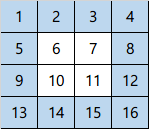Description
Given an n by n 2D matrix representing an image.
Rotate the image by 90 degrees(clockwise).
(번역) 이미지를 나타내는n x n매트릭스가 주어졌을 때, 이미지를 90도(시계방향) 회전한 결과를 리턴하라.
Note
You have to rotate the image in-place, which means you have to modify the input 2D matrix directly. DO NOT allocate another 2D matrix and do the rotation.
(번역) 별도의 2D 매트릭스를 생성하지 않고 in-place하게 Input으로 주어진 매트릭스를 수정하라.
Example
Input matrix = [
[1, 2, 3],
[4, 5, 6],
[7, 8, 9],
],
rotated = [
[7, 4, 1],
[8, 5, 2],
[9, 6, 3],
]풀어보자
In-place??
사실 그냥 회전시키는 건 그렇게 어렵지 않다. 각각의 row를 새로운 매트릭스의 대응되는 컬럼으로 변환시켜주기만 하면 된다. 그런데 In-place라는 조건이 붙으면 좀 고민을 해야한다.
위 방식으로는 결국 n의 auxiliary space가 필요하다.
어쩌라고 그래서!!
매트릭스의 바깥에서 부터 한겹한겹 돌려주면 된다.

바깥 프레임의 시작 인덱스를 start, 끝 인덱스를 end, 현재 index를 i라고 하면
const temp = matrix[start][i]
matrix[start][i] = matrix[end - (i - start)][start]
matrix[end - (i - start)][start] = matrix[end][end - (1 - start)]
matrix[end][end - (i - start)] = matrix[i][end]
matrix[i][end] = temp위와 같은 방식으로 4면의 회전이 가능하다.
이 때 필요한 auxiliary space는 첫 번째 요소를 담아둘 temp 변수 하나면 충분하다.
주의 할 점은 i의 iteration은 start에서 부터 end 전까지 해야한다는 점이다. 그렇지 않으면 각 꼭지점의 요소가 두번 회전되는 결과가 생긴다.
위 과정을 이걸 매트릭스 사이즈의 절반만큼 반복해주면 된다.
구현 코드
/**
* @param {number[][]} matrix
* @return {void} Do not return anything, modify matrix in-place instead.
*/
var rotate = function (matrix) {
let start = 0;
let end = matrix.length - 1;
while (start < end) {
rotateFrame(matrix, start, end);
start++;
end--;
}
return matrix;
};
function rotateFrame(matrix, start, end) {
let temp = 0;
for (let i = start; i < end; i++) {
temp = matrix[start][i];
matrix[start][i] = matrix[end - (i - start)][start];
matrix[end - (i - start)][start] = matrix[end][end - (i - start)];
matrix[end][end - (i - start)] = matrix[i][end];
matrix[i][end] = temp;
}
}Complexity
우선 총 n / 2 프레임 만큼을 회전시켜야 하므로 O(n/2)의 작업이 필요하고, 각 프레임 마다 n에 비례하는 프레임 한 변의 크기만큼 iteration을 수행하므로 전체적인 시간 복잡도는 O(n^2) 이다.

